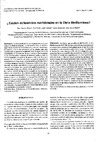Please use this identifier to cite or link to this item:
https://accedacris.ulpgc.es/jspui/handle/10553/74335
| Title: | Are there any nutritional deficiencies in the Mediterranean diet? | Other Titles: | ¿Existen deficiencias nutricionales en la Dieta Mediterránea? | Authors: | Ortega, Rosa María López Sobaler, Ana María Aranceta, Javier Serra-Majem, Lluís |
UNESCO Clasification: | 3206 Ciencias de la nutrición | Keywords: | Deficiencias Dieta mediterránea Alimentos Vitaminas Minerales |
Issue Date: | 2004 | Journal: | Archivos latinoamericanos de nutrición | Abstract: | Are there any nutritional deficiencies in the Mediterranean Diet? The Mediterranean diet has been described as a model from a nutritional and sanitary point of view due to the proportion in which it includes all the food groups. Nevertheless, in the last few years changes in lifestyle have triggered a move away from the recommended intakes in relation to several nutrients. The intake of cereals and vegetables has decreased particularly, while the intake of fats and animal products has increased. The reduced energy expenditure associated with a sedentary lifestyle and the quest for beauty in the form of thinness led to a restricted energy intake. All these changes make it even more difficult to ensure adequate intakes of vitamins and minerals. The Spanish population has problems particularly with vitamins A, D, E, 13, 13, and folic acid, as well as with intake of minerals, which is below recommended values. This problem is most clearly seen in certain groups: women, the elderly, children, gestating and lactating women, ill people, smokers and those under regular medication. Knowing the extent of this reality can be the first step towards the introduction of correcting measures or to initiate campaigns to inform the consumer about the necessary changes in the diet and about the characteristics of the Mediterranean diet which are being lost and should be restored. La dieta mediterránea, por la proporción en la que incluye los distintos alimentos ha sido descrita como un modelo a seguir desde el punto de vista nutricional y sanitario. Sin embargo los cambios que se han producido en los últimos años han condicionado un paulatino alejamiento entre la ingesta real y la recomendada, en relación con diversos nutrientes. Concretamente ha ido disminuyendo el consumo de cereales y verduras, mientras que ha aumentado el consumo de grasas y alimentos de origen animal. La disminución del gasto energético asociado al sedentarismo y la búsqueda de un patrón estético de delgadez llevan a restringir la ingesta energética. Todas estas modificaciones hacen que cada vez resulte más difícil conseguir aportes adecuados de vitaminas y minerales. En la población española el problema es especialmente evidente en relación con las vitaminas A, D, E, B2, B6 y fólico, también la ingesta de minerales es con frecuencia inferior a la recomendada. El problema es especialmente evidente en algunos grupos de población: mujeres, ancianos, niños, gestantes, lactantes, enfermos, fumadores y consumidores habituales de fármacos. Conocer esta realidad puede servir como un primer paso para introducir medidas correctoras o para iniciar campañas encaminadas a transmitir a la población los cambios que resultan más deseables y las características de la dieta mediterránea que se están perdiendo y es necesario recuperar. |
URI: | https://accedacris.ulpgc.es/handle/10553/74335 | ISSN: | 0004-0622 | Source: | Archivos latinoamericanos de nutrición [ISSN 0004-0622], v. 54 (2) (sup. 1), p. 87-91, (Junio 2004) |
| Appears in Collections: | Artículos |
SCOPUSTM
Citations
9
checked on Jun 8, 2025
WEB OF SCIENCETM
Citations
6
checked on Feb 25, 2024
Page view(s)
403
checked on Jan 15, 2026
Download(s)
96
checked on Jan 15, 2026
Google ScholarTM
Check
Share
Export metadata
Items in accedaCRIS are protected by copyright, with all rights reserved, unless otherwise indicated.
